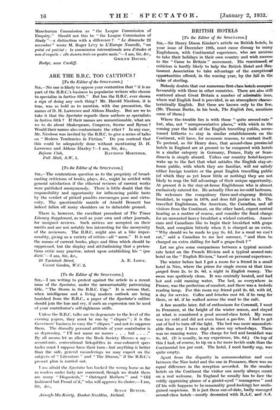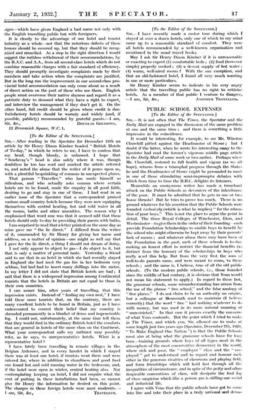BRITISH HOTELS
[To the Editor of the SPECTATOR.] Sue,—Sir Henry Dixon Kimber's article on. British hotels, in your issue of December 19th, must cause dismay to many Englishmen, with Continental experience, who are anxious to take their holidays in their own country and wish success to the " Come to Britain " movement. His resentment Of criticism is hardly likely to help the British Hotel and Ilea- taurant Association to take advantage of the exceptional opportunities offered, in the coming year, by the fall in the value of sterling.
Nobody doubts that our numerous first-class hotels compaae favourably with those in other countries. There are also still scattered about Great Britain a number of admirable inns, where real English food is provided, in an atmosphere charac- teristically English. But these are known only to the few. (Mr. Thomas Burke, in his book, The English Inn, mentions some of them.) Where the-trouble lies is with those "quite second-rate." but, alas, not " unrepresentative places," with which in the coming year the bulk of the English travelling public, accus- tomed hitherto to stay in similar establishments on the Continent, will have, for economic reasons, to content itself. To pretend, as Sir- Henry does, that second-class provincial hotels in England are at present to be compared with hotels in a similar category in Germany, France, Italy or Scan- dinavia is simply absurd. Unless our country hotel-keepers wake up to the fact that what satisfies the English stay-at- home public, with which they are familiar, will not satisfy either foreign tourists or the great English travelling public (of which they as yet know little or nothing) they are not likely to reap the full advantage of their unique opportunity. At present it is the stay-at-home Englishman who is almost exclusively catered for. He actually likes an ice-cold bedroom. He welcomes the compulsory three-and-sixpenny British breakfast, in vogue in 1870, and does full justice to it. The travelled Englishman, the American, the Canadian, and all visitors from the Continent, on the other hand, expect central heating as a matter of course, and consider the fixed charge for an unwanted heavy breakfast a wicked extortion. Ameri- cans and Canadians like to begin their breakfast with grape fruit, and complain bitterly when it is charged as an extra. "Why should we be made to pay Is. 6d. for a meal we can't cat," said a Canadian to me last summer, " and then be charged an extra shilling for half a grape-fruit ? "
Let me give some comparisons between a typical second- rate hotel on the French Riviera and a typical seeond-rate hotel on the " English Riviera," based on personal experience.
The winter before last I got a room for a friend in a small hotel in Nice, where the prices for single_rooms at that time ranged from 2s. to 2s. 6d. a night in English money. The room was, spotlessly clean. It was centrally heated, and had hot and cold running water. The bed, as everywhere in France, was the perfection of comfort, and there was a bedside reading lamp. For this room my friend paid 2s. 6d. with ad, a day for service. Coffee and brioches cost 8d. if he rang for them, or 4d. if he walked across the road to the cafe.
A few months later, full of enthusiasm for Cornwall, I went to Penzance, at the height of the winter season, and stayed at what is considered- a good second-class hotel. My room was icy cold and did not even boast a gas-fire. I had to get out of bed to turn off the light. The bed was more uncomfort- able than any I have slept in since my schooldays. There was no running water. The charge for bed and breakfast was 9s. 6d. (It is usually, in my experience, 10s. 6d.) On top of this I had, of course, to tip on a far more lavish scale_than the Continental ten per cent. The hotel, I need hardly- say, was quite empty.
Apart from the disparity in accommodation and cost between the Nice hotel and the one in Penzance, there was an equal difference in the reception accorded. In the smaller hotels on the Continent the visitor can nearly always count on a real welcome. In England he usually has to face the coldly appraising glance of a gimlet-eyed " manageress " and (if his wife happens to be reasonably good-looking) her undis- guised suspicions-. It is just these-out-of-date, badly managed second-class hotels—mostly decorated with R.A.C. and AA. signs—which have given England a bad- name not only with the English travelling public but with foreigners.
It is clearly to the advantage of our hotel and tourist industry as a whole—not that the notorious defects of these houses should be covered up, but that they should be recog- niZed and r&nedied. As a step in the right direction I would suggest the ruthless withdrawal of their recommendations, by the R.A.C. and A.A., from all second-class hotels which do not combine reasonable charges with a fair standard of efficiency. They sholikl promptly investigate complaints made by their members and take action when the complaints are justified. But in the long run the improvement in our second-class pro- vincial hotel accommodation can only come about as a result of-direct action on the part of those who use them. English people must overcome their native shyness and regard it as a patriotic duty to demand what they have a right to expect, and interview the management if they don't get it. On the other hand, hill credit should be given where credit is due. Satisfactory hotels should be warmly and widely (and, if possible, publicly) recommended by grateful guests.—I am,







































 Previous page
Previous page